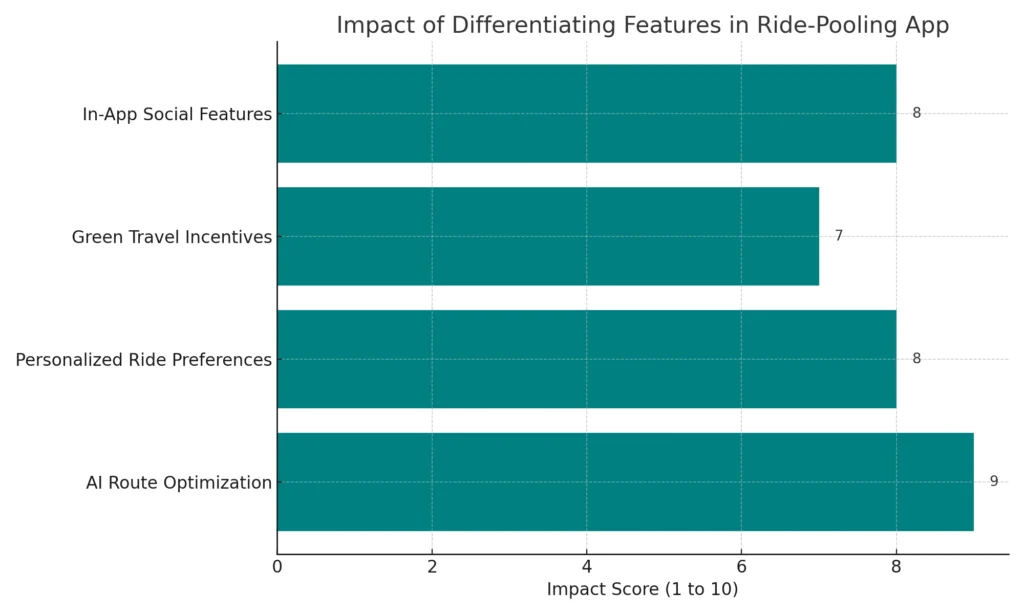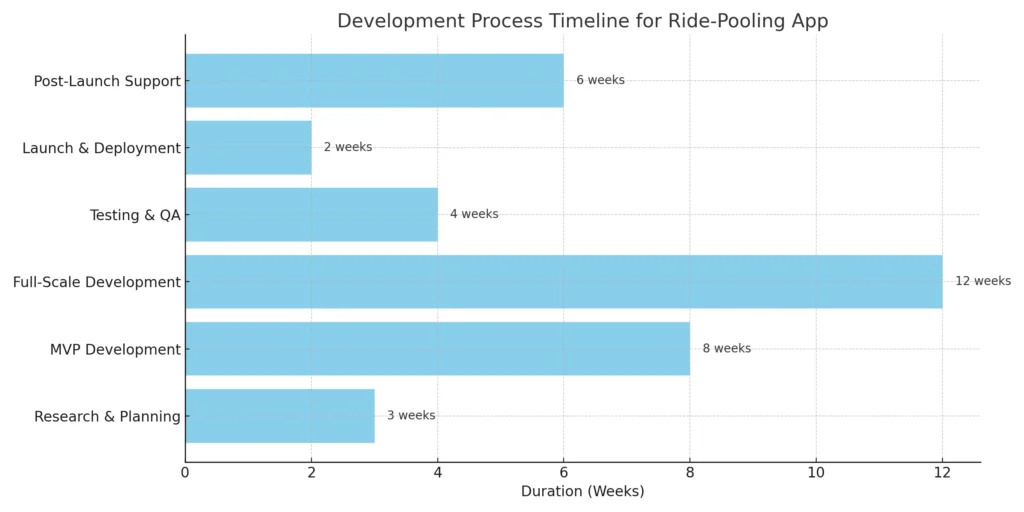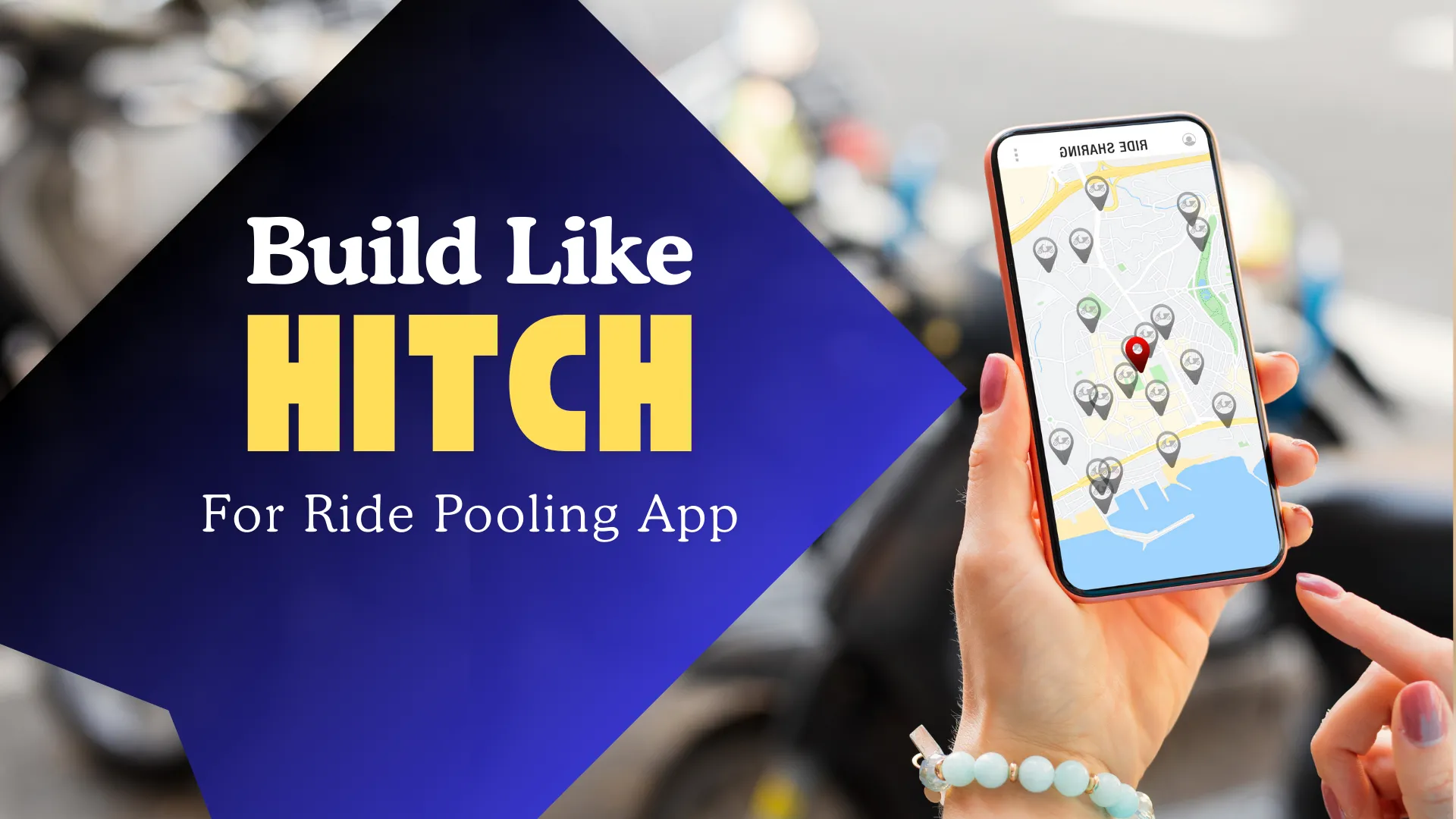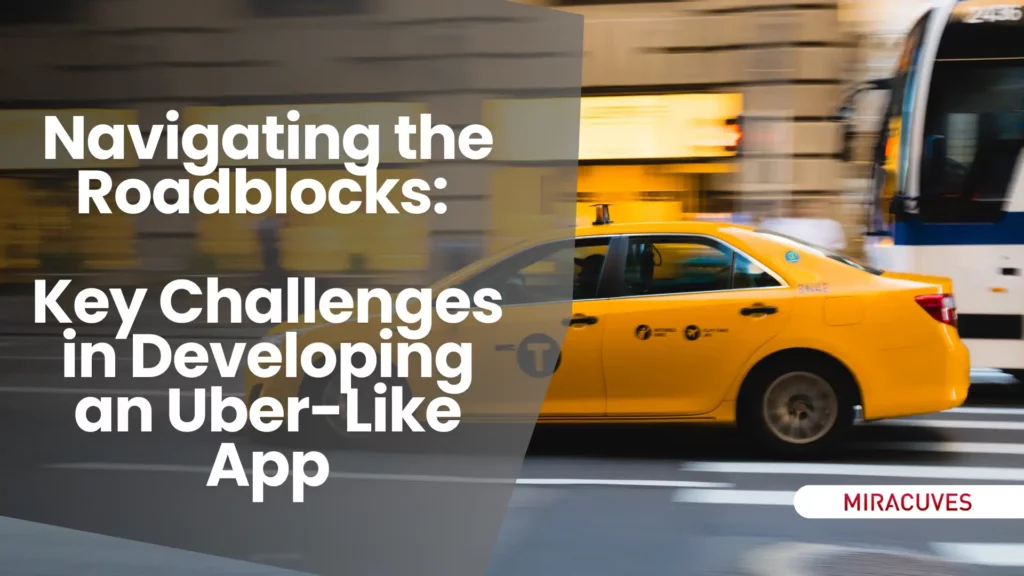In today’s fast-paced world, ride-pooling apps like Hitch are revolutionizing urban transportation. These platforms offer a convenient and affordable way to travel, allowing people heading in the same direction to share rides and split costs. By reducing the number of vehicles on the road, they not only make commuting more eco-friendly but also help alleviate traffic congestion in busy cities.
Building a Hitch-like ride-pooling app gives you the opportunity to tap into the growing demand for sustainable mobility solutions. With the right features, seamless technology, and strategic business model, you can offer a platform that delivers value to riders and drivers alike. This app goes beyond simple ride-hailing—it’s about building community-driven transportation that benefits everyone involved.
This guide will walk you through every step of the process, from key features and technical requirements to monetization strategies and launching your app successfully. Let’s explore how you can create a ride-pooling platform that stands out and makes an impact in the modern transportation landscape.
What the App Is and What It Does
A Hitch like ride-pooling app connects passengers traveling along the same route, allowing them to share a ride and reduce costs. The concept is simple yet powerful: riders book a trip, and the app matches them with others heading in the same direction. Drivers also benefit by earning more per trip through multiple pickups, maximizing their earnings and reducing idle time.
The app’s core goal is to offer affordable, eco-friendly transportation, promoting a community-focused travel experience. By optimizing routes in real-time, it ensures riders reach their destinations efficiently without unnecessary detours. Passengers enjoy a smooth, convenient ride while paying a fraction of the cost compared to solo rides.
Key Features of the App’s Functionality:
- Real-Time Matching: Automatically pairs passengers traveling on similar routes.
- Cost Sharing: Splits fares between riders, making each journey affordable.
- Smart Route Optimization: Reduces travel time with dynamic route adjustments.
- In-App Notifications: Keeps users updated about ride status and driver location.
- Driver Dashboard: Provides drivers with trip details, route information, and earnings tracking.
Why Build This App?
A ride-pooling app like Hitch offers immense potential in today’s world, where people look for affordable, sustainable, and convenient travel options. Creating a platform that connects passengers for shared rides taps into a growing trend toward green transportation while also presenting a lucrative business opportunity.
1. Rising Demand for Affordable Mobility
- With the increasing cost of living and fuel prices, users are looking for ways to cut transportation expenses.
- Ride-pooling allows people to split the fare, making commuting cheaper and more accessible.
2. Support for Sustainable Transportation
- As cities promote eco-friendly solutions, ride-pooling reduces the number of vehicles on the road, helping to lower carbon emissions.
- Launching this app aligns with global efforts toward sustainability and green mobility.
3. Higher Earnings Potential for Drivers
- Drivers can maximize their income by picking up multiple passengers during a single trip, making their work more profitable.
- The app’s smart route optimization ensures minimal delays, allowing drivers to take more trips.
4. Market Opportunity in Urban Areas
- Many urban regions face challenges like traffic congestion and inconsistent public transport services. A ride-pooling app can fill the gap, providing a reliable alternative.
- The rise of remote work and flexible schedules means more people prefer ride-sharing over traditional commuting methods.
What Can I Do to Differentiate It?
In a competitive market filled with ride-pooling apps, standing out requires creativity and a focus on features that deliver added value to both riders and drivers. Below are strategies to make your app unique and engaging, setting it apart from competitors like Hitch.
1. AI-Driven Route Optimization
- Use AI-powered algorithms to plan routes dynamically, minimizing detours and ensuring faster rides.
- The app can predict traffic conditions in real time, ensuring that drivers and passengers experience smooth journeys.
2. Personalized Ride Preferences
- Allow users to select ride preferences, such as choosing quiet rides or preferred music.
- Personalized features create a more comfortable experience and encourage repeat users.
3. Green Travel Incentives
- Launch a carbon offset program where users earn points or rewards for choosing eco-friendly rides.
- Highlight your app’s commitment to sustainability through partnerships with environmental organizations.
4. In-App Social Features
- Introduce carpool communities, allowing frequent riders to connect, plan trips together, and enjoy group discounts.
- Enable shared ride planning for events, promoting your app as a go-to platform for social gatherings and group travel.

Market Size, Growth, and Business Model
The ride-sharing industry is growing at an impressive rate as cities search for sustainable, cost-effective transportation solutions. Ride-pooling platforms like Hitch are leading this movement by reducing travel costs, minimizing congestion, and promoting eco-friendly travel options. This trend has created a lucrative opportunity for businesses aiming to enter the shared mobility space.
Market Size and Growth Trends
- The global ride-sharing market is expected to reach multi-billion dollar valuations in the coming years, driven by rising demand for affordable urban transport.
- Consumers are shifting towards on-demand mobility services as a convenient alternative to traditional public transport or private vehicles.
- Emerging markets are seeing rapid adoption of ride-pooling models, especially in cities with heavy congestion and high commuter volumes.
Business Model Overview
Launching a ride-pooling app offers multiple revenue streams, ensuring the platform stays financially sustainable:
- Commission Model
- Earn a percentage from every ride, generating steady income with increased ride frequency.
- Subscription Plans
- Offer premium memberships to riders for perks like discounted fares or exclusive features.
- In-App Advertising and Partnerships
- Collaborate with local businesses to display targeted ads and promotions.
- Payment Transaction Fees
- Charge small fees for payments processed through the app’s wallet or gateway services.
| Revenue Stream | Description | Profitability Potential | Impact on User Experience |
|---|---|---|---|
| Commission Model | Charge a percentage on every completed ride. | High – Consistent revenue with frequent rides. | Low – Minimal impact on riders, affordable fares. |
| Subscription Plans | Offer premium memberships with discounts and perks. | Moderate – Recurring income from loyal users. | High – Improves rider loyalty and retention. |
| In-App Advertising and Partnerships | Display targeted ads and run promotions with businesses. | Moderate – Depends on ad placement and engagement. | Medium – Ads must remain non-intrusive to retain satisfaction. |
| Payment Transaction Fees | Charge small fees for transactions through the app’s wallet or payment gateway. | High – Scales with the volume of digital payments. | Medium – Seamless payments ensure user convenience. |
Features of the App
Creating a ride-pooling app like Hitch requires a thoughtful combination of user-friendly features that enhance the experience for riders, drivers, and administrators. These features not only ensure smooth functionality but also promote engagement, trust, and satisfaction.
User Features
- Real-Time Matching: Connects passengers with drivers and other riders traveling the same route, ensuring quick ride allocation.
- Split Payments: Allows riders to share fares seamlessly through in-app payment options.
- Ride Preferences: Users can choose preferences such as quiet rides or preferred music.
- Live Ride Tracking: Keeps passengers informed of the ride’s status with real-time GPS tracking and notifications.
Driver Features
- Route Optimization: Provides drivers with smart route suggestions to minimize detours and save time.
- Earnings Dashboard: Displays drivers’ daily and weekly earnings for better financial planning.
- Flexible Shifts: Drivers can manage their availability and log in or out at their convenience.
- In-App Communication: Drivers can chat or call riders directly to coordinate pickup and drop-off efficiently.
Admin and Management Features
- Analytics Dashboard: Offers detailed insights on trips, earnings, and user behavior to optimize operations.
- Driver Management: Helps the admin team track driver performance and compliance with platform rules.
- Compliance Monitoring: Ensures all services align with legal and regulatory requirements for a safe platform.
Technical Requirements
Building a Hitch-like ride-pooling app requires the right technology stack to ensure smooth performance, secure transactions, and scalability. Each component, from backend frameworks to cloud infrastructure, plays a key role in delivering seamless user experiences.
Backend and Database
- Backend Frameworks: Use Node.js or Django to handle real-time ride matching, payments, and data processing efficiently.
- Database: Implement PostgreSQL or MongoDB for secure storage of user data, trip history, and financial transactions.
Frontend Development
- Cross-Platform Frameworks: Develop with Flutter or React Native to create a unified experience across both iOS and Android platforms.
- Responsive Design: Ensure the app works seamlessly on various screen sizes, enhancing user engagement.
API Integrations
- Payment Gateway APIs: Integrate Stripe, Razorpay, or PayPal to provide secure payment options.
- Maps and Location APIs: Use Google Maps API to enable accurate location tracking and smart route suggestions.
- Communication API: Implement Twilio or Firebase for in-app chat and real-time notifications.
Cloud Infrastructure and Hosting
- Cloud Hosting: Use AWS or Google Cloud for a scalable infrastructure that can handle increased traffic during peak hours.
- CDN (Content Delivery Network): Use Cloudflare to ensure fast load times across regions and uninterrupted service.
Security and Compliance
- Data Encryption: Protect user data with SSL encryption to prevent breaches and ensure privacy.
- Two-Factor Authentication (2FA): Add extra security layers for user accounts and driver logins.
- Compliance: Follow regulations like GDPR to maintain user trust and legal alignment.
Performance Monitoring and Analytics
- Crash Reporting Tools: Integrate Sentry or Firebase Crashlytics to detect and resolve bugs quickly.
- Analytics Tools: Use Google Analytics or Mixpanel to track user behavior, ride trends, and app performance.
Using AWS cloud infrastructure ensures your app can scale effortlessly with growing demand (AWS). Cloud solutions provide the flexibility needed to handle peak traffic and deliver a seamless experience to users. With high availability and robust security, AWS keeps your platform reliable, even as you expand to new regions.
| Component | Technology/Service | Purpose |
|---|---|---|
| Backend Framework | Node.js, Django | Manages real-time ride matching, payments, and data processing. |
| Database | PostgreSQL, MongoDB | Stores user data, trip history, and financial transactions securely. |
| Frontend Framework | Flutter, React Native | Provides a seamless cross-platform experience for iOS and Android. |
| Payment Gateway APIs | Stripe, Razorpay, PayPal | Enables secure and diverse payment options. |
| Maps and Location APIs | Google Maps API | Ensures real-time tracking and optimized route suggestions. |
| Communication API | Twilio, Firebase | Facilitates in-app chat and push notifications. |
| Cloud Hosting | AWS, Google Cloud | Provides scalable infrastructure for high traffic periods. |
| CDN (Content Delivery Network) | Cloudflare | Ensures fast load times and smooth performance across regions. |
| Security Measures | SSL Encryption, 2FA | Protects user data and enhances login security. |
| Compliance | GDPR | Ensures the app aligns with data privacy regulations. |
| Analytics Tools | Google Analytics, Mixpanel | Tracks user behavior and app performance. |
| Crash Reporting Tools | Sentry, Firebase Crashlytics | Detects and resolves performance issues quickly. |
Want to develop a ride-sharing app like Hitch?
Our expert team will guide you through building a user-friendly,
scalable, and secure carpooling platform..
Design and User Interface (UI/UX)
The design and user experience of a Hitch-like ride-pooling app play a critical role in attracting and retaining users. A well-designed app ensures smooth interactions, clear navigation, and an enjoyable experience for both riders and drivers. The goal is to make the platform intuitive, visually appealing, and functional, ensuring users can book and complete rides effortlessly.
1. Clean and Intuitive Interface
- Use simple layouts and clear icons for easy navigation, ensuring users can book rides in just a few taps.
- Avoid clutter and focus on a minimalist design that highlights key features such as ride tracking and payment options.
2. Personalized User Experience
- Allow users to customize their ride preferences—quiet rides, music choices, or preferred drivers.
- Integrate AI-powered suggestions to recommend frequently traveled routes or preferred pickup points based on user behavior.
3. Light and Dark Modes
- Offer both light and dark mode options to enhance usability during different times of the day, reducing eye strain for users and drivers.
4. Real-Time Ride Tracking and Notifications
- Provide interactive maps that allow users to see their driver’s location in real time.
- Send push notifications about ride status, estimated arrival time, and trip updates to keep users informed throughout their journey.
5. Driver and Passenger Communication
- Integrate in-app chat or call features to ensure smooth communication between drivers and passengers.
- This feature helps coordinate pickups and resolve minor issues quickly.
Usability Testing and Feedback Loops
- Conduct user testing and gather feedback to improve the app continuously.
- Use feedback insights to refine the design, ensuring a flawless user experience.
Read More About “Build a Ride Hailing Platform: Your Complete Bolt Clone Guide”
Development Process
Building a Hitch-like ride-pooling app involves a structured, step-by-step approach to ensure every phase is executed smoothly. A well-organized development process ensures that the final product meets market needs and user expectations, delivering a reliable, user-friendly platform.
Step 1: Research and Planning
- Market Analysis: Identify key features by analyzing competitors and user preferences.
- Feature Prioritization: Define core functionalities such as real-time ride matching, payments, and notifications.
- Roadmap Creation: Create a detailed development plan with clear milestones.
Step 2: MVP (Minimum Viable Product) Development
- Focus on essential features for a basic working version—ride booking, payments, and driver-rider communication.
- Launch the MVP to a small group of users for feedback and testing.
- Use insights to refine features before moving to full-scale development.
Step 3: Full-Scale Development
- Add advanced features like AI-powered route optimization, loyalty programs, and ride preferences.
- Develop separate interfaces for riders, drivers, and administrators to streamline operations.
- Ensure cross-platform compatibility by using frameworks like Flutter or React Native.
Step 4: Testing and Quality Assurance (QA)
- Perform extensive functional, security, and performance testing to detect and resolve issues.
- Use load testing to ensure the app handles high traffic seamlessly.
- Get feedback from testers to identify any usability challenges.
Step 5: Launch and Deployment
- Submit the app to Google Play Store and Apple App Store, ensuring compliance with their policies.
- Prepare marketing campaigns to promote the app and attract early users.
- Offer launch discounts or referral rewards to encourage downloads.
Step 6: Post-Launch Support and Updates
- Monitor user feedback and roll out regular updates to enhance the app continuously.
- Use analytics tools to track performance, optimize features, and plan future improvements.
- Provide ongoing technical support to ensure smooth operation.

Cost Estimation and Timeframe
Developing a ride-pooling app like Hitch requires careful planning of both budget and time. Understanding the cost breakdown for each phase ensures that the project stays on track without overspending. Below is a typical estimate of costs and timelines, covering every stage of development from concept to launch.
1. Research and Planning
- Cost: $5,000 – $8,000
- Timeframe: 2 – 4 weeks
- Involves market research, competitor analysis, and feature prioritization.
2. MVP Development
- Cost: $20,000 – $35,000
- Timeframe: 8 – 12 weeks
- Builds the essential app features like ride booking, payments, and notifications.
3. Full-Scale Development
- Cost: $40,000 – $70,000
- Timeframe: 12 – 16 weeks
- Adds advanced features such as AI-based route optimization and driver dashboards.
4. Testing and Quality Assurance (QA)
- Cost: $7,000 – $12,000
- Timeframe: 3 – 4 weeks
- Ensures the app runs smoothly with functional and load testing.
5. Launch and Deployment
- Cost: $5,000 – $10,000
- Timeframe: 2 weeks
- Covers app store submissions and pre-launch marketing efforts.
6. Post-Launch Support and Updates
- Cost: $10,000 – $20,000 annually
- Ongoing: Continuous monitoring, technical support, and feature updates.
| Development Phase | Estimated Cost | Timeframe | Description |
|---|---|---|---|
| Research and Planning | $5,000 – $8,000 | 2 – 4 weeks | Market analysis, feature prioritization, and roadmap creation. |
| MVP Development | $20,000 – $35,000 | 8 – 12 weeks | Build core features like ride booking, payments, and notifications. |
| Full-Scale Development | $40,000 – $70,000 | 12 – 16 weeks | Add advanced features, including AI-powered route optimization. |
| Testing and Quality Assurance | $7,000 – $12,000 | 3 – 4 weeks | Conduct functional and performance testing to ensure smooth operation. |
| Launch and Deployment | $5,000 – $10,000 | 2 weeks | Submit to app stores and execute pre-launch marketing. |
| Post-Launch Support and Updates | $10,000 – $20,000 annually | Ongoing | Monitor performance, roll out updates, and provide technical support. |
Monetization Strategies
A successful ride-pooling app like Hitch needs multiple revenue streams to stay profitable and sustainable over time. Monetizing smartly ensures that the app not only provides affordable services to users but also generates consistent income. Below are some effective monetization strategies tailored for your ride-pooling app.
1. Commission from Rides
- Charge a small percentage on each completed ride from both drivers and riders.
- This ensures steady, scalable revenue as the number of users and trips grow.
2. Subscription Plans for Users and Drivers
- Offer membership plans with benefits like discounted rides, priority booking, or premium features.
- Subscription income provides a recurring revenue stream, encouraging loyalty among both drivers and riders.
3. In-App Advertising and Partner Promotions
- Collaborate with local businesses to display targeted ads and special offers within the app.
- Use in-app advertising strategically to boost revenue without disrupting the user experience.
4. Transaction Fees for In-App Payments
- Collect small transaction fees on payments made through the app’s integrated wallet or payment gateway.
- Encouraging in-app payments boosts convenience for users and adds another layer of income.
5. Referral Programs and Partner Campaigns
- Launch referral bonuses for users who invite others to join the platform, fostering organic growth.
- Collaborate with travel or event companies to offer bundled services, generating extra revenue.
Launching and Marketing the App
Launching your ride-pooling app successfully requires more than just a functioning platform—it demands a strategic marketing plan that creates buzz, attracts early users, and builds momentum. Here’s a roadmap to ensure your app makes a strong impact from day one.
Pre-Launch Strategy
- Teasers and Social Media Campaigns: Start creating excitement weeks before launch with teasers on social platforms and countdowns.
- Beta Testing: Release the app to a small group of users to gather feedback and identify areas for improvement.
- Referral Program: Offer incentives like free rides or discounts to users who invite friends to join the app before launch.
Launch Day Execution
- Launch Promotions: Provide limited-time discounts or exclusive deals to attract early adopters.
- Collaborate with Influencers: Partner with influencers or local businesses to promote the app during the launch phase.
- Press Releases and Media Outreach: Get media attention by issuing press releases about your app’s features and launch event.
Post-Launch Engagement
- Push Notifications and Email Campaigns: Keep users engaged by sending updates, offers, and ride reminders.
- Loyalty Programs: Introduce reward programs to retain users and encourage frequent rides.
- Monitor Feedback and Optimize: Continuously track user feedback and app analytics to identify trends and implement improvements.
Legal and Regulatory Considerations
Launching a ride-pooling app like Hitch involves navigating various legal frameworks to ensure compliance with transportation, data privacy, and financial regulations. A well-regulated platform builds trust with users and drivers while minimizing operational risks. Below are the key areas to address before launch.
1. Transportation and Driver Licensing
- Ensure that drivers meet all local transportation requirements, including proper vehicle licensing and insurance coverage.
- Set up a driver verification system to validate documents and perform background checks.
2. Data Privacy Compliance
- Implement GDPR or CCPA policies to safeguard user data and provide transparency on how personal information is used.
- Use end-to-end encryption to protect in-app communications and financial transactions.
3. Financial and Payment Regulations
- Follow KYC (Know Your Customer) and AML (Anti-Money Laundering) protocols to prevent fraudulent activities.
- Work with authorized payment gateways to ensure compliance with financial transaction laws.
4. Employment and Labor Policies
- Clearly define drivers’ roles as independent contractors or employees based on regional labor laws.
- Ensure fair compensation and adherence to working hours regulations to avoid legal complications.
5. Insurance and Liability Management
- Provide comprehensive insurance coverage for drivers and passengers to manage risks during rides.
- Develop clear terms of service and dispute resolution policies to handle conflicts efficiently.
It is essential to comply with GDPR policies to ensure user data privacy and trust (GDPR). Following these standards demonstrates your commitment to user security and helps avoid potential legal complications. Proper data management builds credibility, encouraging users to share information comfortably, knowing their data is protected.
Future Growth and Scalability
To ensure long-term success, your ride-pooling app must be scalable and ready for future growth. The goal is to expand services, adapt to market trends, and keep innovating to meet evolving user expectations. A forward-thinking approach will help you stay ahead of competitors and maintain relevance as mobility trends continue to shift.
1. Geographic Expansion
- Expand the app’s reach to new cities and regions with high demand for shared mobility.
- Customize services based on local needs, such as regional language support and payment methods.
- Use data analytics to identify ideal markets for expansion opportunities.
2. Adding New Services
- Introduce additional services like micro-mobility (scooters and bikes) or parcel delivery, increasing the app’s value.
- Offer specialized ride options such as electric or eco-friendly rides to appeal to environmentally conscious users.
3. AI and Data-Driven Improvements
- Use AI-powered analytics to predict rider behavior and improve route optimization.
- Continuously analyze ride data to develop new features, such as personalized ride recommendations.
4. Building Strategic Partnerships
- Collaborate with local businesses to offer bundled services (e.g., discounted food with rides).
- Work with governments or environmental groups to support green mobility initiatives.
5. Continuous Innovation and Updates
- Keep the platform fresh by rolling out new features and enhancing the user interface regularly.
- Monitor emerging technologies (such as autonomous vehicles) and assess how they could integrate with the platform in the future.
Why Trust Miracuves Solutions for Your Next Project?
Choosing the right development partner is crucial when launching a ride-pooling app. Miracuves Solutions brings expertise, speed, and affordability to the table, ensuring your app is built to thrive in a competitive market. Here’s why Miracuves Solutions is the perfect partner for your project:
1. Proven Expertise in App Development
- With a track record of creating multi-service platforms, Miracuves Solutions knows what it takes to develop feature-rich, high-performing apps.
- Our team specializes in mobility solutions, including real-time ride matching, payment integrations, and AI-powered optimization.
2. Unmatched Speed and Efficiency
- We complete development projects 30x faster than industry norms, helping you get to market quickly.
- Agile processes allow us to pivot and adjust based on your feedback, ensuring the final product meets your vision perfectly.
3. Cost-Effective Solutions
- Miracuves Solutions delivers high-quality products at 10% of the global average cost. This means more savings without compromising on innovation or performance.
- We provide comprehensive end-to-end services, from planning and development to deployment and post-launch support.
4. Future-Ready Development Approach
- Our scalable solutions ensure your app can grow with demand, supporting future expansion and feature updates.
- We keep your platform competitive by integrating the latest technologies and offering seamless updates.
5. Dedicated Post-Launch Support
- Miracuves Solutions offers continuous maintenance and technical support, ensuring your app runs smoothly.
- We use data insights and performance analytics to recommend improvements and maximize user satisfaction.
Conclusion
Building a ride-pooling app like Hitch is more than just developing a transportation service—it’s about creating a platform that brings convenience, affordability, and sustainability to modern-day commuting. By offering smart ride-sharing solutions, you not only address urban challenges like traffic congestion but also tap into a profitable business model that meets the growing demand for eco-friendly mobility.
With the right combination of core features, scalable technology, and user-centric design, your app can stand out in the market and deliver exceptional value to both drivers and riders. From strategic monetization to seamless user experiences, every detail contributes to the success of your platform.
Choosing Miracuves Solutions as your development partner ensures your project benefits from expertise, speed, and cost-efficiency. With our support, your vision becomes a reality—ready to disrupt the mobility market and grow into a thriving platform.
Now is the time to take the first step toward launching your ride-pooling app. With thoughtful planning and the right execution, you’ll be well on your way to creating a trusted and profitable transportation solution that reshapes how people travel.
Why start from scratch?
Our ready-made ride-sharing app solution is fast, scalable,
and fully customizable.
FAQs
How much does it cost to build a Hitch-like ride-pooling app?
Developing a ride-pooling app can cost between $50,000 and $100,000, depending on the features, design complexity, and technology used. Working with Miracuves Solutions ensures cost-efficient development at 10% of the global average.
How long does it take to develop the app?
The entire development process, from planning to launch, typically takes 4 to 6 months. This timeframe includes building the MVP, testing, and full-scale deployment.
What features are essential for a ride-pooling app?
Key features include real-time ride matching, split payments, route optimization, live tracking, and seamless in-app communication between drivers and riders.
What is the best way to monetize the app?
Effective monetization strategies include commission-based income, subscription plans, in-app ads, and transaction fees for payments processed through the app’s wallet.
How can I ensure the app stays competitive in the future?
Continuously update the platform with new features and analyze user data to improve the experience. Expanding services, like micro-mobility options or delivery services, can also keep the app relevant.
Check out our popular ride-sharing app solutions offered by Miracuves – built for flexibility, performance, and global reach:
- InDriver Clone – A dynamic ride-hailing app where riders and drivers negotiate fares in real time, offering more control and transparency.
- Uber Clone – A complete ride-sharing platform with GPS tracking, fare estimation, driver management, and seamless payments.
- Lyft Clone – A user-friendly transportation app with scheduled rides, driver ratings, and real-time route tracking.
- Careem Clone – Book safe, reliable rides from economy to executive. Track your driver in real-time, get fare estimates, and enjoy cashless rides.







